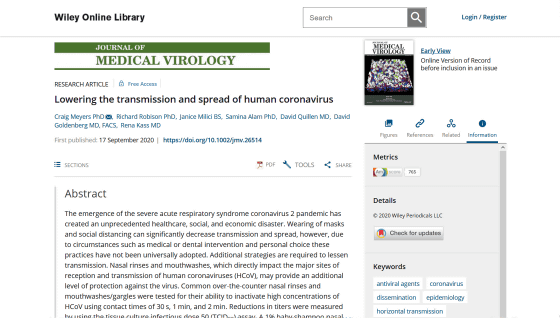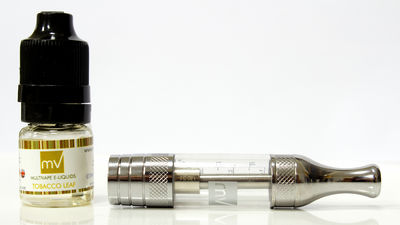Mouthwash may inactivate new coronavirus

by
The World Health Organization (WHO) recommends washing hands with soap and wearing a mask as a countermeasure against the new coronavirus (SARS-CoV-2), which continues to spread around the world. New studies have shown that mouthwashes and nasal irrigation drugs can inactivate SARS-CoV-2.
Lowering the transmission and spread of human coronavirus --Meyers ---- Journal of Medical Virology --Wiley Online Library
https://onlinelibrary.wiley.com/doi/10.1002/jmv.26514

Mouthwashes, oral rinses may inactivate human coronaviruses | Penn State University
Mouthwash May Help to Neutralise Coronavirus, Experiment With Human Cells Suggests
https://www.sciencealert.com/mouthwash-may-help-to-neutralise-coronavirus-experiment-with-human-cells-suggests
It is said that commercially available mouthwashes and nasal mouthwashes have a bactericidal action, but experiments using human cells have not been conducted to see if they have an action to inactivate SARS-CoV-2. That thing. Therefore, a research team led by Professor Craig Meyers of Penn State University conducted an experiment using human cells cultured in the laboratory to investigate whether mouthwash and nasal mouthwash inactivate SARS-CoV-2. The we.
The research team used human coronavirus 229E (HCoV-229e) instead of SARS-CoV-2 in this experiment, which causes a cold. HCoV-229e is readily available and seems to be genetically similar to SARS-CoV-2, and the research team claims that HCoV-229e functions as a replacement for SARS-CoV-2. ..
Experiments have verified the effect of inactivating HCoV-229e in mouthwash, nasal mouthwash, and baby shampoo diluted to 1%. Baby shampoo is a hair care product that removes stains on the hair, but baby shampoo diluted to 1% is sometimes used by doctors to clean the sinuses.

First, the research team contacted human cells with a solution containing HCoV-229e, cultured them, and counted the number of viruses. After that, the virus-containing solution was allowed to interact with mouthwash or nasal mouthwash, baby shampoo solution diluted to 1%, etc., and how much the virus was inactivated in the contact time of 30 seconds, 1 minute, and 2 minutes. Was investigated.
As a result of the experiment, it was found that the baby shampoo diluted to 1% inactivated 99% or more of the virus after 1 minute of contact and 99.9% or more of the virus after 2 minutes of contact. Mouthwash and nasal mouthwash also inactivate 99.99% of the virus after just 30 seconds, and the researchers said they couldn't detect the infectious virus if they interacted for a minute or two. ..
Mouthwash and nasal irrigation cleanse the mouth and nose, which are the most important sites for virus spread and invasion, so Mayers points out that the results of this experiment are promising. To further extend the results of the experiment, he argues that clinical trials should be considered to see if mouthwash and others reduce viral load in SARS-CoV-2 positive individuals.
'People who are SARS-CoV-2 positive and quarantined at home can infect people who live with them with the virus, and certain people, including dentists and other healthcare professionals,' said Mayers. Occupations are always at risk of being exposed to the virus.Clinical trials can determine whether products such as mouthwash reduce the amount of virus that spreads when positive patients talk or cough. I need it. ' He said that if the use of mouthwash etc. could reduce the chance of spreading the infection by 50%, it would have a big impact.

Related Posts:
in Science, Posted by log1h_ik







